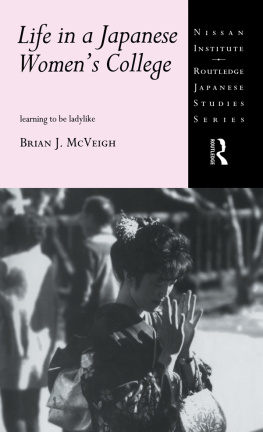Life in a Japanese Womens College
The Nissan Institute/Routledge Japanese Studies Series
Editorial Board
J.A.A. Stockwin, Nissan Professor of Modern Japanese Studies, University of Oxford and Director, Nissan Institute of Japanese Studies.
Teigo Yoshida, formerly Professor of the University Tokyo, and now Professor, Obirin University, Tokyo
Frank Langdon, Professor, Institute of International Relations, University of British Columbia, Canada
Alan Rix, Professor of Japanese, The University of Queensland
Junji Banno, Institute of Social Science, University of Tokyo
Leonard Schoppa, University of Virginia
Other titles in the series include:
The Myth of Japanese Uniqueness, Peter Dale
A History of Japanese Economic Thought, Tessa Morris-Suzuki
The Establishment of the Japanese Constitutional System, Junji Banno, translated by J.A.A. Stockwin
Industrial Relations in Japan: the Peripheral Workforce, Norma Chalmers
Education Reform in Japan, Leonard Schoppa
How the Japanese Learn to Work, Ronald P. Dore and Mari Sako
Japanese Economic Development: Theory and Practice, Penelope Francks
Britains Educational Reform: a Comparison with Japan, Mike Howarth
Language and the Modern State: the Reform of Written Japanese, Nanette Twine Industrial Harmony in Modern Japan: the Invention of a Tradition, W. Dean Kinzley
The Japanese Numbers Game: the Use and Understanding of Numbers in Modern Japan, Thomas Crump
Ideology and Practice in Modern Japan, Roger Goodman and Kirsten Refsing
Technology and Industrial Development in Pre-War Japan, Yukiko Fukasaku
Japans Early Parliaments 1890-1905, Andrew Fraser, R.H.P. Mason and Philip Mitchell
Japans Foreign Aid Challenge, Alan Rix
Emperor Hirohito and Showa Japan, Stephen S. Large
Japan: Beyond the End of History, David Williams
Ceremony and Ritual in Japan: Religious Practices in an Industrialized Society, Jan van Bremen and D.P. Martinez
Understanding Japanese Society: Second Edition, Joy Hendry
Militarization and Demilitarization in Contemporary Japan, Glenn D. Hook
Growing a Japanese Science City, James Dearing
Democracy in Post-war Japan, Rikki Kersten
Architecture and Authority in Japan, William H. Coaldrake
The Right to Life in Japan, Noel Williams
On the Margins of Japanese Society, Carolyn S. Stevens
Womens Giday and the Japanese Theatre Tradition, A. Kind Coaldrake
First published 1997
by Routledge
2 Park Square, Milton Park, Abingdon, Oxon, 0X14 4RN
Simultaneously published in the USA and Canada
by Routledge
270 Madison Ave, New York NY 10016
Transferred to Digital Printing 2006
1997 Brian J. McVeigh
All rights reserved. No part of this book may be reprinted or reproduced or utilized in any form or by any electronic, mechanical, or other means, now known or hereafter invented, including photocopying and recording, or in any information storage or retrieval system, without permission in writing from the publishers.
British Library Cataloguing in Publication Data
A catalogue record for this book is available from the British Library.
Library of Congress Cataloguing in Publication Data
McVeigh, Brian J.
Life in a Japanese womens college: learning to be ladylike / Brian J. McVeigh
p. cm. - (Nissan Institute/Routledge Japanese studies) Includes bibliographical references and index.
1. Women-Education (Higher)-Social aspects-Japan-Case studies. 2. Takasu International College-Students. 3. Women college students-Japan-Social conditions-Case studies.
4. Social role-Japan. I. Title. II. Series: Nissan Institute/Routledge Japanese studies series.
LC2366.M3841996
376.650952-dc20096-19652
CIP
ISBN 0-415-14456-6
Publishers Note
The publisher has gone to great lengths to ensure the quality of this reprint but points out that some imperfections in the original may be apparent
... we are a people whose glorious history will bear to be held up to the gaze of Western nations. We have learned a great many things from the West, but there are some instances of our having outstripped our tutors. So wrote Count Okuma in Fifty Years of New Japan, published in 1910, some five years after Japan had emerged victorious in the Russo-Japanese war. Over the 86 years that have elapsed since those words were written, the history of Japans relations with the rest of the world has passed through phases more turbulent than Okuma could probably have imagined. The tragic and terrible history of the 1930s and 1940s gave way, however, to decades in which the Japanese forged an amazing (and often deserved) reputation for economic development and efficiency. The idea of the Japanese outstripping their tutors is no longer as exotic as it must have sounded to an English-speaking readership in 1910, but its content has been radically changed with the passage of time. At the same time, Japans performance and practice continues to attract withering scepticism from some Americans and others. In a recent message on the Internet, Chalmers Johnson attacks Chrysanthemum Clubbers and writes that one of his interlocutors ... seems not to know that Japan has basked in the favorable and exceptional treatment of the United States from John Foster Dulless peace treaty to Mickey Kantos last minute dive last summer in the auto talks. How the Japanese seek to resolve the dilemma of how far they can preserve a distinctive Japanese identity and practice in an increasingly globalizing world is fascinating to watch.
The Nissan Institute/Routledge Japanese Studies Series is ten years old in 1996. The Series seeks to foster an informed and balanced, but not uncritical, understanding of Japan. One its aims is to show the depth and variety of Japanese institutions, practices and ideas. Another is, by using comparison, to see what lessons, positive and negative, can be drawn for other countries. The tendency in commentary on Japan to resort to outdated, ill-informed or sensational stereotypes still remains, and needs to be combated.
There are a number of studies about Japanese education available in English. Certain aspects of education in Japan - such as the alleged prowess of Japanese schoolchildren in mathematics - have received international attention, as has the view, to be found in some publications, that the approach to education is narrow, even repressive, and inhibits creativity. Plainly, not all educational institutions in Japan are structured in the same way, or have the same basic set of aims. Any national educational system is highly complex and has variety in its parts. This is true of Japan, even though the Ministry of Education exercises substantial control over the structuring of the whole, and observers will detect Japanese elements in the ethos of practically any of its constituent unites. Dr Brian McVeigh examines in this book a specific institution, namely an international college for young ladies on the outskirts of a major Japanese city. In his words, he investigates the relationship between practice, body, self, and knowledge acquisition, of how rituality, routinization, formalization and conventionalized social action build knowledge. He is impressed by the evident theatricality of the approach to education that the college has adopted, and most intriguingly of all, with the function of its expressed internationalizing purpose in conjunction with the dominant aim of turning out young ladies well brought up in a recognizably Japanese tradition. The book constitutes a fascinating insight into the dialectic between interacting with the outside world and maintaining intact something recognizable as the Japanese ethos.








